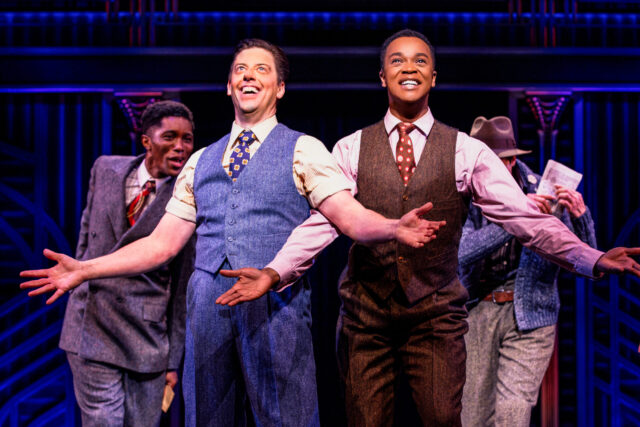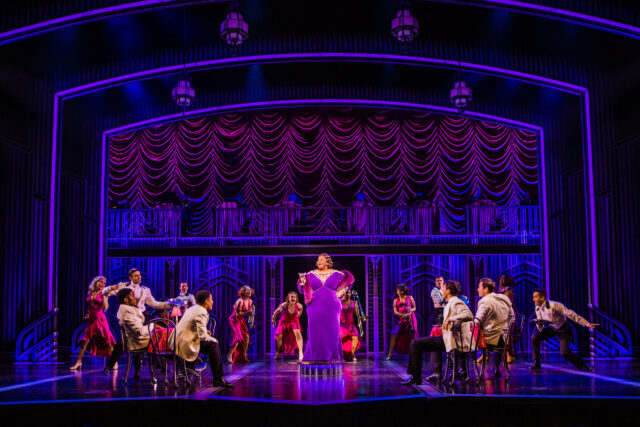
Christian Borle and J. Harrison Ghee star in Some Like It Hot on Broadway (photo by Marc J. Franklin)
SOME LIKE IT HOT
Shubert Theatre
225 West Forty-Fourth St. between Broadway & Eighth Ave
Tuesday – Sunday through September 3, $94-$278
somelikeithotmusical.com
Call it “Some Like a Plot.”
Fifty years ago, Tony-winning composer Jule Styne, five-time Tony-nominated lyricist Bob Merrill, and two-time Tony-winning book writer Peter Stone turned Billy Wilder’s Oscar-winning 1959 comedy, Some Like It Hot, into the Broadway musical Sugar, which ran for more than a year and was nominated for four Tonys. In 2002, Tony Curtis, who played Joe in the film, portrayed Osgood Fielding III in a national road tour revival.
Lighting does not strike thrice with the latest Broadway adaptation, titled Some Like It Hot, a lukewarm show scheduled to run at the Shubert into September. Among other things, book writers Matthew López and Amber Ruffin fiddle with the original plot so much that it ends up insulting the film as well as the audience, updating the story to supposedly make it more palatable for modern times.
The basic narrative is still intact. It’s 1933, and saxophonist Joe (Christian Borle) and stand-up bassist Jerry (J. Harrison Ghee) are having a difficult time making ends meet in Depression-era Chicago. After witnessing a gangland killing, they need to get out of town fast, and they disguise themselves as women — Joe as Josephine, Jerry as Daphne — to get jobs with Sweet Sue’s all-woman Society Syncopators, who are on a train trip heading to a big gig. Spats Columbo (Mark Lotito) and his goons are on the two men’s trail, with Detective Mulligan (Adam Heller) not far behind, tracking down Spats for racketeering, loan sharking, bootlegging, and now murder. Meanwhile, Joe has fallen madly in love with the lead singer of the Society Syncopators, Sugar Kane (Adrianna Hicks), and creates a fake male character in order to win her affections, while an older millionaire, the goofy but charming Osgood Fielding III (Kevin del Aguila), has taken an immediate shine to Daphne. Mistaken identity, slapstick comedy, clever dialogue, and more than a touch of misogyny ensue in the film, but the musical shoehorns in themes of race and gender identity that are as inconsistent as they are disrespectful to the original and the themes themselves.
Auditioning for a nightclub manager, Joe is furious when the man rejects Jerry because he’s Black, leading into the song “You Can’t Have Me (If You Don’t Have Him),” in which Joe actually sings, “Yes, he’s my brother through and through / Like the Marx, the Wrights, the Grimm! / Yeah, you can’t have ‘tea’ without the ‘two’ / And you can’t have me if you don’t have him.” Jerry: “You can’t break up a winning team.” Joe: “Like that crutch and Tiny Tim.” Jerry: “And you can’t have ‘ah’ without the” — Joe: “‘choo!’” It’s not exactly Tony Curtis and Sidney Poitier on the run, shackled together in The Defiant Ones. Meanwhile, most people won’t get the inside joke when the manager and Jerry refer to Jerry as Houdini, a role Curtis played in a 1953 biopic.
The big show that Sweet Sue believes will make or break the band is in California instead of Florida as in the film, perhaps because California is a more liberal state and Florida is no favorite of the LBGTQIA+ community and allies. The casting is not race-blind; sometimes it’s important that a character is Black, and sometimes it’s not, which left me scratching my head more than once. Meanwhile, instead of Joe impersonating an oil scion who sounds like Cary Grant in order to woo Sugar, as in the film, in the musical Joe pretends to be screenwriter Kiplinger Von Der Plotz, who speaks in an insensitive fake-German accent (referencing the Austrian Wilder), saying such things as “Ah! Break a leg! Or, as we say in Vienna, ‘Brekken . . . ein lekken . . . gedorf.’”

Classic Hollywood film is transformed into a lukewarm musical at the Shubert (photo by Matthew Murphy)
One major new twist does work, and that involves Jerry’s transformation into Daphne, a change that the character embraces, even if it does screw around with the finale, one of the most famous final lines in Hollywood history, delivered by Joe E. Brown.
Faced with movie roles created by Curtis as Joe/Josephine, Jack Lemmon as Jerry/Daphne, Marilyn Monroe as Sugar, George Raft as Spats, Joan Shawlee as Sweet Sue, and Pat O’Brien as Agent Mulligan, the cast tries its best to make us forget about those actors, but it’s a mountainous task. Ghee (Mrs. Doubtfire, Kinky Boots) is wonderful as Jerry/Daphne, using his long, lithe body to challenge preconceptions and prejudices about race and gender. Unfortunately, Borle (Little Shop of Horrors, Something Rotten!) appears to be in a completely different show, lost in vaudeville shtick that even he doesn’t understand. In addition, while Ghee’s transformation into Daphne is both delightful and believable, Borle always looks like himself as Josephine, with nary an adjustment of voice or movement.
Hicks (Six) gives more agency to Sugar, famously played by Monroe as a dumb blond with a heart of gold, but she still has to sing such lines as “Tell the boys in the band Sugar’s giving up sax / I’m California bound / Cause I’m safer in the long run with an all-girl band / And it’s time to say adieu to every one night stand.” NaTasha Yvette Williams (Chicken & Biscuits, Porgy and Bess) nearly brings the house down whenever Sweet Sue McGinty belts one out, but a surprise revelation diminishes what was previously an intelligent, dedicated character. Lotito is hamstrung as Spats, but Del Aguila (Frozen, Rocky) has fun as Osgood.
Director and choreographer Casey Nicholaw (The Book of Mormon, Mean Girls) cannot leave well enough alone, turning nearly part of Scott Pask’s set into a prop for a dance, no matter how improbable; a late scene with rows of doors drones on and on and on and was better done in Bugs Bunny cartoons. There’s also an inordinate amount of tap-dancing by Joe and Jerry as the Tip Tap Twins, which sent my tap-dancing-fan friends into paroxysms of joy but brought the narrative to a screeching halt every time for me. The music, by Marc Shaiman, and the lyrics, by Shaiman and Scott Wittman, who have previously collaborated on such Broadway musicals as Hairspray, Catch Me If You Can, and Charlie and the Chocolate Factory, are unmemorable.
Turning movies into Broadway musicals is often problematic, especially when adapting a beloved, star-studded Hollywood classic. While changes and updates are often necessary and welcome, they are ideally done within the spirit of the original, or at least make sense and don’t feel haphazard. As Sue says in the musical, “Our entire future depends on this show being perfect.” But as we know from the film, “nobody’s perfect.”